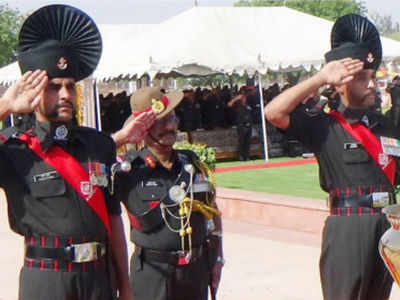- News
- Education News
- News
- A career of valour, passion
Trending
This story is from June 7, 2016
A career of valour, passion

If You Want To Become An Engineer, The Armed Forces Have A Job For You. And They Offer A Free Degree, Too
It's that time of the year, when students have to make choices that will define their careers. To have many choices is wonderful but when the options are many, making an informed decision is a challenge. TOI's `Mission Admission' guides students.Today's focus: Defence
The pride of serving the country, even at the cost of one's life, has almost always been at the heart of a person's decision to enrol in the armed forces. Few young people, however, realise that there are various aspects, and specialisations, that a career in the forces offers. The engineering corps, for instance.

“Many people are not aware of the fact that the Army and Navy provide free training for engineering degrees and the cadets pass out as lieutenants and sub-lieutenants respectively at the end of five years which includes one year of basic military training,“ says A Surendren, director of Defence Academy , Chennai. He attributed the low awareness to the fact that OTA, Gaya is comparatively a newly extended training establishment while the initiation of B Tech in INA was very recent (2009).
The advantage of taking up engineering courses in the military academies is that unlike anywhere else, the students are first made to undergo a year of military training and then four years of engineering. This inculcates discipline among the candidates and also gives them a thorough understanding of the military .
The engineering courses offered in these defence academies keep the focus on military technology so that graduates can have a thorough understanding of the different aspects of defence and can be placed in the appropriate sectors once they graduate. While the National Defence Academy (NDA) offers BSc and BA degrees, Officers Training Academy and Indian Naval Academy offer engineering courses.
“These engineering courses are well-designed ones and fall at the next level after the NDA. The graduates are placed as engineering officers and are trained to be well acquainted with the machinery. Indian Army or Navy equipment is used for training purposes as part of the course too,“ says Surendren.
The engineering officers provide the technical support provide the technical support to the fighters through maintenance and manufacture of military machinery. Many also join defence organisations like the DRDO.
While NDA requires clearing UPSC exam, OTA Gaya and INA Ezhimala have no written tests. There is no entrance exam unlike other private and government engineering colleges. Students are shortlisted based on their performance in Class 12 board exam. The cut off varies between 80% and 90%. This is followed by Service Selection Board (SSB) interview, a five-day personality test.
“Once the candidate is selected, he undergoes basic military training in the first year. From the second year onwards, they are inducted in one of the army colleges based on their chosen field. While the education is fully sponsored by the government, the student has to deposit a nominal amount to cover his personal expenditure,“ says major Sujith.
The Service Selection Board scientifically analyses each candidate's potential and compatibility for commission into the armed forces. “The Army does not look for toppers but all-rounders. Intelligence is crucial but more important is effective intelligence, which will keep one outwitting their opponents in each step of their career,“ says retired brigadier Albert Pakianathan, who was awarded the Vishisht Seva Medal twice.
It's that time of the year, when students have to make choices that will define their careers. To have many choices is wonderful but when the options are many, making an informed decision is a challenge. TOI's `Mission Admission' guides students.Today's focus: Defence
The pride of serving the country, even at the cost of one's life, has almost always been at the heart of a person's decision to enrol in the armed forces. Few young people, however, realise that there are various aspects, and specialisations, that a career in the forces offers. The engineering corps, for instance.

Experts say a section of students are knowledgeable about the National Defence Academy (NDA), Pune, but awareness about engineering courses in Officers Training Academy in Gaya or Indian Naval Academy in Kerala, Asia's largest naval academy, is generally very low.
“Many people are not aware of the fact that the Army and Navy provide free training for engineering degrees and the cadets pass out as lieutenants and sub-lieutenants respectively at the end of five years which includes one year of basic military training,“ says A Surendren, director of Defence Academy , Chennai. He attributed the low awareness to the fact that OTA, Gaya is comparatively a newly extended training establishment while the initiation of B Tech in INA was very recent (2009).
The advantage of taking up engineering courses in the military academies is that unlike anywhere else, the students are first made to undergo a year of military training and then four years of engineering. This inculcates discipline among the candidates and also gives them a thorough understanding of the military .
The engineering courses offered in these defence academies keep the focus on military technology so that graduates can have a thorough understanding of the different aspects of defence and can be placed in the appropriate sectors once they graduate. While the National Defence Academy (NDA) offers BSc and BA degrees, Officers Training Academy and Indian Naval Academy offer engineering courses.
“These engineering courses are well-designed ones and fall at the next level after the NDA. The graduates are placed as engineering officers and are trained to be well acquainted with the machinery. Indian Army or Navy equipment is used for training purposes as part of the course too,“ says Surendren.
The engineering officers provide the technical support provide the technical support to the fighters through maintenance and manufacture of military machinery. Many also join defence organisations like the DRDO.
While NDA requires clearing UPSC exam, OTA Gaya and INA Ezhimala have no written tests. There is no entrance exam unlike other private and government engineering colleges. Students are shortlisted based on their performance in Class 12 board exam. The cut off varies between 80% and 90%. This is followed by Service Selection Board (SSB) interview, a five-day personality test.
“Once the candidate is selected, he undergoes basic military training in the first year. From the second year onwards, they are inducted in one of the army colleges based on their chosen field. While the education is fully sponsored by the government, the student has to deposit a nominal amount to cover his personal expenditure,“ says major Sujith.
The Service Selection Board scientifically analyses each candidate's potential and compatibility for commission into the armed forces. “The Army does not look for toppers but all-rounders. Intelligence is crucial but more important is effective intelligence, which will keep one outwitting their opponents in each step of their career,“ says retired brigadier Albert Pakianathan, who was awarded the Vishisht Seva Medal twice.
End of Article
FOLLOW US ON SOCIAL MEDIA










